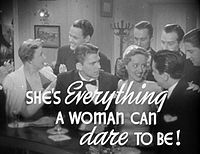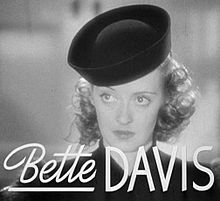- Dark Victory
-
Dark Victory 
Poster promoting Oscar nominationsDirected by Edmund Goulding Produced by Hal B. Wallis Written by Casey Robinson
Based on the play by George Brewer and Bertram BlochStarring Bette Davis
George Brent
Humphrey Bogart
Ronald ReaganMusic by Max Steiner Cinematography Ernest Haller Editing by William Holmes Studio Warner Bros. Distributed by Warner Bros. Release date(s) April 22, 1939 Running time 104 minutes Country United States Language English Dark Victory is a 1939 American drama film directed by Edmund Goulding and starring Bette Davis, George Brent, Humphrey Bogart, and Ronald Reagan. The screenplay by Casey Robinson was based on the unsuccessful 1934 play of the same title by George Brewer and Bertram Bloch.
Contents
Plot
Judith Traherne (Bette Davis) is a young, carefree, hedonistic Long Island socialite/heiress with a passion for horses, fast cars, and too much smoking and drinking. She initially ignores severe headaches and brief episodes of dizziness and double vision, but when she uncharacteristically takes a spill while riding, and then tumbles down a flight of stairs, her secretary/best friend Ann King (Geraldine Fitzgerald) insists she see the family doctor, who refers her to a specialist.
Dr. Frederick Steele (George Brent) is in the midst of closing his New York City office in preparation of a move to Brattleboro, Vermont, where he plans to devote his time to brain cell research and scientific study on their growth. He reluctantly agrees to see Judith, who is cold and openly antagonistic toward him. She shows signs of short-term memory loss, but dismisses her symptoms. Steele convinces her the ailments she is experiencing are serious and potentially life-threatening, and puts his career plans on hold to tend to her.
When diagnostic tests confirm his suspicions, Judith agrees to surgery to remove a malignant brain tumor. Steele discovers the tumor cannot be completely removed, and realizes she has less than a year to live. The end will be painless but swift - shortly after experiencing total blindness, Judith will pass away.
In order to allow her a few more months of happiness, Steele opts to keep the diagnosis a secret and assures Judith and Ann the surgery was a success. Ann is suspicious and confronts Steele, who admits the truth. She agrees to remain silent.
Judith and Steele become involved romantically and eventually engaged. While helping his assistant pack the office prior to their departure for Vermont, Judith discovers her case history file containing letters from several doctors, all of them confirming Steele's prognosis. Assuming Steele was marrying her out of pity, Judith breaks off the engagement and reverts to her former lifestyle. One day, her stablehand Michael O'Leary (Humphrey Bogart), who for years has loved her from afar, confronts her about her unruly behavior and she confesses she is dying. Their conversation convinces her she should spend her final months happy, dignified, and with the man she loves. She apologizes to Steele, and the two marry and move to Vermont. (Throughout the film Judith and O'Leary engage in arguments about the prospects of a colt, Challenger. O'Leary insists Challenger will never make a racehorse while Judith sees him as a future champion, and just before her death O'Leary admits she was correct.)
Three months later, Ann comes to visit. She and Judith are in the garden planting bulbs when Judith comments on how odd it is she still feels the heat of the sun under the rapidly darkening skies. She realizes she actually is losing her vision and approaching the end. Steele is scheduled to present his most recent medical findings (which hold out the long-term prospect of a cure for this type of cancer) in New York, and Judith, making an excuse to remain home, helps him pack and sends him off. Then, after bidding Ann, her housekeeper Martha (Virginia Brissac), and her dogs farewell, she climbs the stairs, lies down on her bed. We see her face and the image blurs to grey.
Cast
- Bette Davis as Judith Traherne
- George Brent as Dr. Frederick Steele
- Geraldine Fitzgerald as Ann King
- Humphrey Bogart as Michael O'Leary
- Henry Travers as Dr. Parsons
- Ronald Reagan as Alec Hamm
- Cora Witherspoon as Carrie
- Dorothy Peterson as Miss Wainwright
- Virginia Brissac as Martha
- Charles Richman as Colonel Mantle
- Herbert Rawlinson as Dr. Carter
- Leonard Mudie as Dr. Driscoll
- Fay Helm as Miss Dodd
- Lottie Williams as Lucy
Production
Tallulah Bankhead starred as Judith Traherne in the 1934 Broadway production, which ran for 51 performances at the Plymouth Theatre.[1]
In 1935, David O. Selznick wanted to cast Greta Garbo in Dark Victory, but Garbo chose to play the lead in Anna Karenina instead.
Dark Victory was the eighth on-screen teaming of Bette Davis and George Brent. Davis had recently ended affairs with William Wyler and Howard Hughes and her husband Ham Nelson had filed for divorce, and after the first few days of filming she begged to be released from her contract, claiming she was too sick to continue. Producer Hal Wallis responded, "I've seen the rushes - stay sick!" She found comfort with Brent, who had just divorced Ruth Chatterton, and the two embarked on an affair that continued throughout filming and for a year after.[2]
The tune "Oh, Give Me Time for Tenderness" sung by Judith was written by Edmund Goulding and Elsie Janis. The voice of Vera Van was dubbed for Davis.
Another scene for the ending was filmed but ultimately deemed anticlimactic and not used. After Judith's death, her horse was seen winning a race, and her stablehand Michael (Humphrey Bogart) was shown crying. The scene met with negative response with sneak preview audiences and was cut.[3]
The film premiered at Radio City Music Hall.
Reception
In his review in the New York Times, Frank S. Nugent observed: "A completely cynical appraisal would dismiss it all as emotional flim-flam, a heartless play upon tender hearts by a playwright and company well versed in the dramatic uses of going blind and improvising on Camille. But it is impossible to be that cynical about it. The mood is too poignant, the performances too honest, the craftsmanship too expert. Miss Davis, naturally, has dominated — and quite properly — her film, but Miss Fitzgerald has added a sentient and touching portrayal of the friend, and George Brent, as the surgeon, is — dare we say? — surprisingly self-contained and mature. This once we must run the risk of being called a softy: we won't dismiss Dark Victory with a self-defensive sneer."[4]
Variety called the film "intense drama" and "a nicely produced offering [with] Bette Davis in a powerful and impressive role."[5]
Time Out London critic Tom Milne writes: "[Davis] and [director Edmund] Goulding almost transform the soap into style; a Rolls-Royce of the weepie world."[6]
The film was included at #32 in AFI's 100 Years... 100 Passions.
Awards and nominations
Bette Davis was nominated for the Academy Award for Best Actress but lost to Vivien Leigh in Gone with the Wind. Max Steiner, who was nominated for the Academy Award for Best Original Score for both this and Gone with the Wind, lost to Herbert Stothart for The Wizard of Oz. The film itself lost the Academy Award for Best Picture to Gone with the Wind.
Adaptions
On March 6, 1952, CBS Radio's Hollywood On Stage aired a condensed 30 minute version starring Barbara Stanwyck and David Brian.[7]
Remakes
In 1963, the film was remade as Stolen Hours with Susan Hayward. The time frame was updated and the locale changed to England. In 1976, it was remade under its original title as an NBC television movie starring Elizabeth Montgomery as television producer Katherine Merrill under the care of Dr. Michael Grant, portrayed by Anthony Hopkins. In 1952, the film was remade under its original title for a TV adaptation for the Broadway Television Theatre starring Sylvia Sidney, Christopher Plummer, and Ian Keith.
References
- ^ Dark Victory at the Internet Broadway Database
- ^ Dark Victory at Turner Classic Movies
- ^ DVD audio commentary by film historian James Ursini and CNN film critic Paul Clinton, 2005 issue, Warner Home Video
- ^ New York Times review
- ^ Variety review
- ^ Time Out London review; Time Out Film Guide 2009, 2008, London: Time Out Group, p242
- ^ http://radiogoldindex.com/cgi-local/p2.cgi?ProgramName=Hollywood+Sound+Stage
External links
- Dark Victory at the Internet Movie Database
- Dark Victory at the TCM Movie Database
- Dark Victory at AllRovi
The films of Edmund Goulding 1920s 1930s Paramount on Parade (segment) • The Devil's Holiday • Reaching for the Moon • Night Angel • Grand Hotel • Blondie of the Follies • Riptide • The Flame Within • That Certain Woman • White Banners • The Dawn Patrol • Dark Victory • The Old Maid • We Are Not Alone1940s 'Til We Meet Again • The Great Lie • Forever and a Day • The Constant Nymph • Claudia • Of Human Bondage • The Razor's Edge • Nightmare Alley • Everybody Does It1950s Screenplays The Perfect Lover (1919) • A Regular Girl (1919) (with Frances Marion) • A Daughter of Two Worlds (1920) • Dangerous Toys (1921) • The Devil (film) (1921) • Tol'able David (1921) (with Henry King) • Peacock Alley (1922) (with Robert Z. Leonard) • The Seventh Day (1922) • Fascination (1922) • Broadway Rose (1922) • Till We Meet Again (1922) • Heroes of the Street (1922) (with Mildred Considine) • Fury • Dark Secrets (1923) • Jazzmania (1923) • The Bright Shawl (1923) • Bright Lights of Broadway (1923) • Tiger Rose (1923) • Dante's Inferno (1924) • Gerald Cranston's Lady (1924) • The Dancers (1925) • The Fool (1925) • Havoc (1925)Categories:- English-language films
- 1939 films
- 1930s romance films
- American romantic drama films
- 1930s drama films
- Films based on plays
- Black-and-white films
- Warner Bros. films
- Films directed by Edmund Goulding
- Films set in Vermont
- Cancer-related films
Wikimedia Foundation. 2010.


